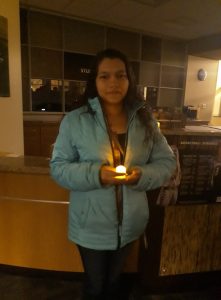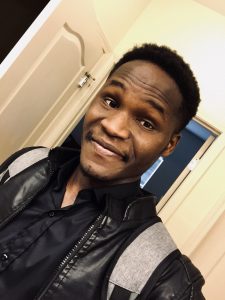Global UGRAD Students Participate in Celebrating Black History
February is Black History Month – a time set aside to collect, preserve, and celebrate the accomplishments of black Americans across all fields. This month we are pleased to share reflections from two Global UGRAD participants on African American history.

Madeline Hernandez, Nicaragua, Emporia State University: On January 21st in Emporia, Kansas, many students, including me, commemorated Dr. Martin Luther King Jr. Day at a ‘Candlelight Vigil.’ They gave candles to all the people that were there and reproduced part of Dr. King’s well known speech named ‘I Have a Dream.’
I was so honored to be part of the commemoration. After the speech, many students gave some words and opinions. That day I learned that it is important for Americans, both black and white people, to celebrate this day. They commemorate Dr. King’s legacy which was for all, no matter the race, gender, or sexual orientation. For Americans his legacy is more of freedom, equality, and to serve others. He inspired Americans to keep going, to fight for what’s good for society, and to respect one another.
One of the students said: ‘This should not be only a one-day thing. Dr. King should be commemorated all the days of the year.’ It actually caught my attention of how a man’s actions can influence and inspire many people.
Mohamed M’bareck, Mauritania, Troy University: I was eight when I first heard of the ‘Black Atlantic,’ a term that I did not recognize. I knew that the Atlantic is an ocean because I memorized every geographic lesson I had, however, the color associated with it created a great deal of confusion to me at the time. I remember that I reached out to my father seeking clarification, but the information he provided made me more confused than I already was. Not only was the information shocking but also was excruciatingly bloodcurdling. As an innocent child who had no idea how certain mentalities are shaped and in what manner people may act when they want certain things done, it was difficult for me to understand the ways in which Africans were brought to the new world.
 That’s how my story with African American literature began. I needed answers and explanations which my parents deliberately agreed I was too immature to understand. In high school, I was exposed to the American civil war and Dr. Martin Luther King, Jr. from a historical perspective where the information was broadly presented, and this left me with more riddles to puzzle out. I started reading about slaves and their stories such as Fredrick Douglas, Harriet Jacobs, and many others who had enlightened other slaves through education and set the stage for the future generation to proudly fight for equality after being mistreated and misrepresented with a variety of stereotypical characters such as the sambo, the mammy, the pickaninnies, etc. that some scholars believe still affect the American society today.
That’s how my story with African American literature began. I needed answers and explanations which my parents deliberately agreed I was too immature to understand. In high school, I was exposed to the American civil war and Dr. Martin Luther King, Jr. from a historical perspective where the information was broadly presented, and this left me with more riddles to puzzle out. I started reading about slaves and their stories such as Fredrick Douglas, Harriet Jacobs, and many others who had enlightened other slaves through education and set the stage for the future generation to proudly fight for equality after being mistreated and misrepresented with a variety of stereotypical characters such as the sambo, the mammy, the pickaninnies, etc. that some scholars believe still affect the American society today.
I chose to take a class related to the African American literature to expand my knowledge and understanding of the subject and also to beneficially learn from the American experience to help ameliorate the current situation in my own society which is not very different from how things once were in America. Mauritania is deplorably one of the few countries that arguably still has slavery today. In spite of the efforts made by both the government and many abolitionist organizations, it is still a matter of disagreement whether or not everyone enjoys their freedom in the country.